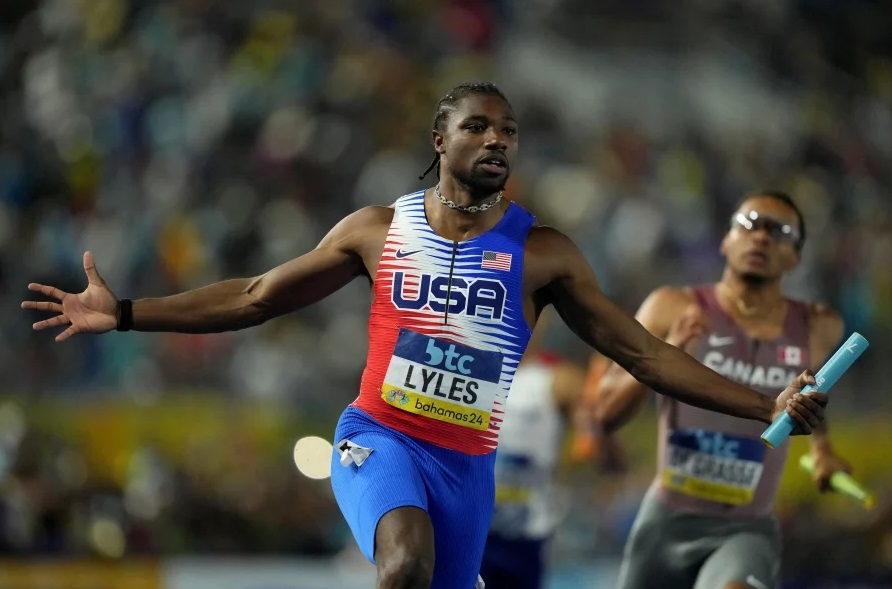After helping her nation to a heat win and Olympic qualification on Saturday, Gabby Thomas vowed they could go even quicker in the final. She wasn’t wrong.
The women’s 4x100m championship record of 41.88 had been set at the inaugural World Athletics Relays in Nassau in 2014. A decade on, another US quartet made history in the Bahamian capital, as Tamari Davis, Thomas, Celera Barnes and Melissa Jefferson combined to clock 41.85 and cap a successful campaign.
They won by almost a second, while France proved they will be a force at their home Olympics later this year by securing the runner-up spot in 42.75. Third place was claimed by Great Britain & NI in 42.80.
As she had done in the previous day’s heats, Davis got the race started for USA, running a strong first leg to put her nation ahead. Olympic and world 200m medallist Thomas, who joined Davis on USA’s world title-winning team in Budapest last year, was ready to take over and she maintained the advantage before handing the baton to Barnes.
They had put Jefferson in a great position and the win never looked in doubt, as the two-time world relay gold medallist surged down the home straight. The fight for second place was won by France, as Mallory Leconte – racing in lane one – held off Great Britain’s Aleeya Sibbons. Germany finished fourth and Australia fifth.
While her teammates posed for photos, Thomas left the track to prepare for the 4x400m final less than 20 minutes later, which USA also won.
The men’s 4x100m championship record of 37.38 was also set by USA in Nassau but in 2015, during the second edition of the event. It still stands, but only just, as Courtney Lindsey, Kenny Bednarek, Kyree King and Noah Lyles teamed up to run a world-leading 37.40.
That same US quartet had run 37.49 to win the heats and they were similarly dominant in the final, winning by almost half a second ahead of 2022 world champions Canada.
Olympic 200m champion Andre De Grasse anchored Canada to second place in 37.89. Olympic champions Italy crossed the line next, but the team was later disqualified for a changeover occurring outside the zone. As a result, France secured third place in 38.44, just 0.01 ahead of Japan and Great Britain who both clocked 38.45 and were separated by only one thousandth of a second.
“We were talking after the race about what else we can do,” said Lyles, who ran the anchor leg during USA’s world title win in Budapest after his individual 100m and 200m victories. “Me and Kyree can get more out of that exchange zone and Kenny and Kyree can do the same. We were faster today, but still, it is all about the zone.”
The team certainly looked in the zone. Lindsey ran the first leg, going up against Canada’s Aaron Brown. Bednarek then took over from Lindsey and ran the second leg against athletes including Italy’s Olympic 100m champion Marcell Jacobs.
Bednarek handed the baton to King and then Lyles powered home to secure the win, chased by De Grasse, France’s Aymeric Priam and Sota Miwa of Japan.

Teams that missed out on Paris places on day one had another chance to book their spots for the Olympics in a second round of races ahead of the finals on Sunday. Competition was fierce, with the top two in each of the three heats securing automatic qualification for the Olympics.
The 2021 World Relays winners Italy cruised to the first 4x100m Paris place of the evening, winning the first women’s heat in 42.60. It shows they mean business as despite not making it through to defend their title in Nassau, they went more than a second faster than their winning time from three years ago. Cote d’Ivoire missed out on an automatic qualifying place by just three thousands of a second on day one but multiple global medallist Marie-Josee Ta Lou-Smith was determined that her team would not be denied again. She received the baton behind Italy and Spain but stormed past Maria Isabel Perez, and almost caught Arianna De Masi, to secure the second spot in 42.63.
Jamaica will defend their Olympic title after they secured their Paris place on the second attempt. After finishing fifth in their race in the first round, they were dominant winners on day two, with world U20 200m bronze medallist Alana Reid crossing the finish line in 42.74. More than half a second back, Trinidad and Tobago’s Leah Bertrand gave chase to finish second in 43.54.

Nigeria and Switzerland were well away in the third and final heat and while Nigeria clinched victory in a close finish – 42.71 to 42.75 – they were both rewarded with Paris places.
The first of the evening’s men’s 4x100m races saw Germany triumph, as Yannick Wolf held on for the win in 38.57. But the real drama was happening behind him. Liberia were in fourth place at the final changeover but Joseph Fahnbulleh blazed the anchor leg, overtaking Brazil and then Switzerland to clinch an Olympic spot by five thousandths of a second. Liberia and Switzerland both clocked 38.65 – a national record for the former – while Brazil followed in fourth.
Ghana and Nigeria ran away with the second heat and their places for the Olympics never seemed in doubt as they clocked 38.29 and 38.57, respectively. There was more success for Africa in the third and final heat as Akani Simbine ran a storming anchor for South Africa. After that final leg timed at 8.92, he crossed the finish line with 38.08 on the clock to ensure his team will be in Paris.
They’ll be joined by Australia, who were pipped for second place by just four thousandths of a second in the first round, as the quartet went 0.04 quicker than on day one to finish runner-up in 38.46.


